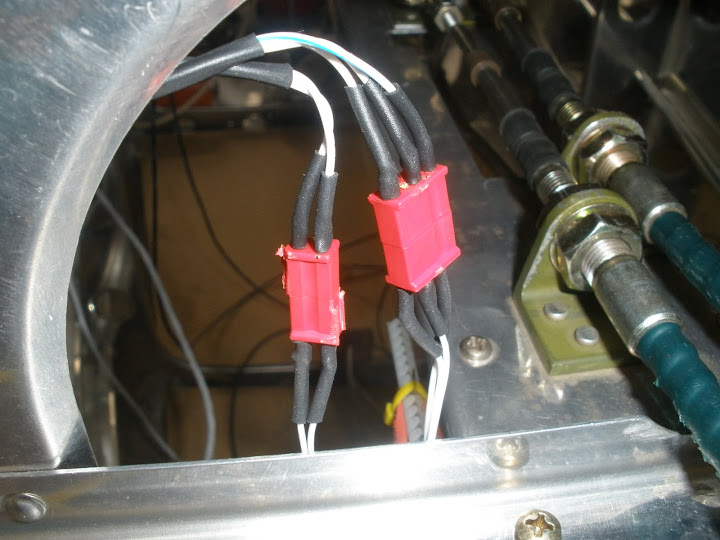I am finishing up the tail and I would like to take some of your advise and solder a pigtail on to the short wires that are provided with servo. One source said he (thought) it was 26 gauge wire. Can anyone be more definitive? If that is the right gauge, what is the wire called and where is best place to buy?
Van's Air Force
You are using an out of date browser. It may not display this or other websites correctly.
You should upgrade or use an alternative browser.
You should upgrade or use an alternative browser.
Wire for Trim Tab Servo
- Thread starter 330Jock
- Start date
Mike S
Senior Curmudgeon
Mike S
Senior Curmudgeon
Also, take a look at how I did the installation of the electrical connectors, you might consider something like this.
http://www.vansairforce.com/community/showthread.php?t=68671&highlight=connector
http://www.vansairforce.com/community/showthread.php?t=68671&highlight=connector
rzbill
Well Known Member
Pretty much the same
You may have seen the method proposed by Aeroelectric (cutting the metal tabs off a 9 pin D-Sub and soldering the shell together).
I did this at first, until I realized this assy would not fit through the holes in the tail.
I basically hacked up another D-sub to make 5-pin connectors as small as Mike purchased from the model shop.
Link to a picture
I like the model shop idea.
You may have seen the method proposed by Aeroelectric (cutting the metal tabs off a 9 pin D-Sub and soldering the shell together).
I did this at first, until I realized this assy would not fit through the holes in the tail.
I basically hacked up another D-sub to make 5-pin connectors as small as Mike purchased from the model shop.
Link to a picture
I like the model shop idea.
Mike S
Senior Curmudgeon
Mike are you saying that you had enough wire that you did not need to splice wires coming from servo?
That is what I remember, but you need to realize that the 10 uses a remote servo, it is just under the bulkhead in this photo. I am only talking about the length to reach the Deans connectors, not the extra 20--25' to reach the front of the plane. When you remove the H stab in a 10, the servo and drive assembly stays in the fuse, the two green push/pull cables shown in the photo run back to the trim tab. More info here, and drawings. http://www.vansairforce.com/community/showpost.php?p=564953&postcount=2

For planes that mount the servo in the elevator, you will need to extend the wires forward as needed (3' or so??) depending on where you put the plug.
Last edited:
grayforge
Well Known Member
I picked up a spool of No-Clean solder so you don't have to do any special cleaning work to prevent corrosion:
http://www.hmcelectronics.com/product/Kester-Solder/SN633124550
http://www.hmcelectronics.com/product/Kester-Solder/SN633124550
DaleB
Well Known Member
Is Radio Shack solder good enough, or is there another product that you guys recommend? Fine wire electrical work is new to me just like airplane building!!
Radio Shack sells some solder that will do fine. I'd go for solder about as fine as you can get. .032 is a little thick, I'd prefer .025 or .020. There's a large online auction site that is also a good source for rolls and partial rolls of good quality Kester rosin-core solder.
I have switched pretty much entirely to lead-free solder (Sn/Cu/Ag) with no-clean flux for nearly everything I do, but if you're new to soldering you will probably find a roll of rosin-core Sn/Pb (73/37 or 60/40) easier to work with. And if you have not soldered before... PRACTICE. Find a local ham radio operator who builds his own gear if you can. There are good solder joints, acceptable solder joints and bad solder joints. You want to make the good kind.
Edit: You want RMA or no-clean flux - NOT water soluble)
grayforge
Well Known Member
Dale, does the lead free solder buy you any benefit besides eco/health? IE, performance benefits in an aircraft. The ones I've looked at have a higher melting point than the solder containing lead I use. This might not be an issue when soldering wire to wire, but it could be when soldering to sensitive circuit boards.
Thanks,
Russ
Thanks,
Russ
DaleB
Well Known Member
Russ,Dale, does the lead free solder buy you any benefit besides eco/health? IE, performance benefits in an aircraft. The ones I've looked at have a higher melting point than the solder containing lead I use. This might not be an issue when soldering wire to wire, but it could be when soldering to sensitive circuit boards.
Personally, I believe the health and environmental benefits are close to null, unless you have a habit of eating a sandwich while you solder. The melting point is somewhat higher -- I set my temp. controlled iron for 725 or 750 F with no-lead, 650 with tin/lead.
The electronic manufacturing industry has switched to lead-free in most of the world, and I suspect most US manufacturing is lead-free also to avoid export issues. I use all lead-free because a lot of my stuff ends up in the EU, and they get uptight about it. I have not noticed any benefit to going lead-free, but it's a little more of a challenge due to the higher temps and it doesn't seem to flow & wet as well. With a little care and practice, though, you can get perfectly fine solder joints. With proper technique you're no more likely to damage a PCB or parts with lead-free than with tin/lead.




